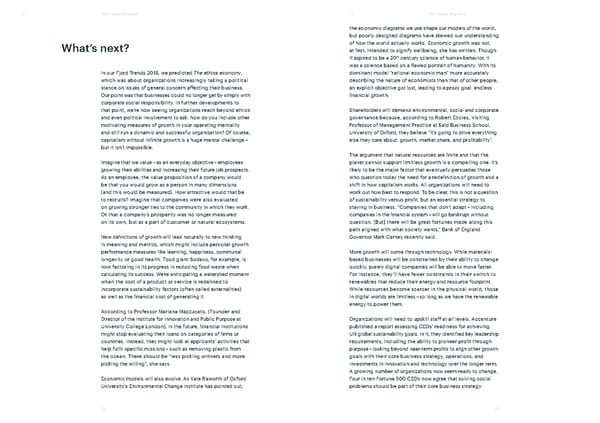T1 Many faces of growth T1 Many faces of growth the economic diagrams we use shape our models of the world, but poorly designed diagrams have skewed our understanding What’s next? of how the world actually works. Economic growth was not, at first, intended to signify wellbeing, she has written. Though it aspired to be a 20th century science of human behavior, it was a science based on a flawed portrait of humanity. With its In our Fjord Trends 2018, we predicted The ethics economy, dominant model “rational economic man” more accurately which was about organizations increasingly taking a political describing the nature of economists than that of other people, stance on issues of general concern affecting their business. an explicit objective got lost, leading to a proxy goal: endless Our point was that businesses could no longer get by simply with financial growth. corporate social responsibility. In further developments to that point, we’re now seeing organizations reach beyond ethics Shareholders will demand environmental, social and corporate and even political involvement to ask: how do you include other governance because, according to Robert Eccles, Visiting motivating measures of growth in your operating mentality Professor of Management Practice at Saïd Business School, and still run a dynamic and successful organization? Of course, University of Oxford, they believe “it’s going to drive everything capitalism without infinite growth is a huge mental challenge – else they care about: growth, market share, and profitability”. but it isn’t impossible. The argument that natural resources are finite and that the Imagine that we value – as an everyday objective – employees planet cannot support limitless growth is a compelling one. It’s growing their abilities and increasing their future job prospects. likely to be the major factor that eventually persuades those As an employee, the value proposition of a company would who question today the need for a redefinition of growth and a be that you would grow as a person in many dimensions shift in how capitalism works. All organizations will need to (and this would be measured). How attractive would that be work out how best to respond. To be clear, this is not a question to recruits? Imagine that companies were also evaluated of sustainability versus profit, but an essential strategy to on growing stronger ties to the community in which they work. staying in business. “Companies that don’t adapt – including Or that a company’s prosperity was no longer measured companies in the financial system – will go bankrupt without on its own, but as a part of customer or natural ecosystems. question. [But] there will be great fortunes made along this path aligned with what society wants,” Bank of England New definitions of growth will lead naturally to new thinking Governor Mark Carney recently said. in meaning and metrics, which might include personal growth performance measures like learning, happiness, communal More growth will come through technology. While materials- longevity or good health. Food giant Sodexo, for example, is based businesses will be constrained by their ability to change now factoring in its progress in reducing food waste when quickly, purely digital companies will be able to move faster. calculating its success. We’re anticipating a watershed moment For instance, they’ll have fewer constraints in their switch to when the cost of a product or service is redefined to renewables that reduce their energy and resource footprint. incorporate sustainability factors (often called externalities) While resources become scarcer in the physical world, those as well as the financial cost of generating it. in digital worlds are limitless – so long as we have the renewable energy to power them. According to Professor Mariana Mazzucato, (Founder and Director of the Institute for Innovation and Public Purpose at Organizations will need to upskill staff at all levels. Accenture University College London), in the future, financial institutions published a report assessing CEOs’ readiness for achieving might stop evaluating their loans on categories of firms or UN global sustainability goals. In it, they identified key leadership countries. Instead, they might look at applicants’ activities that requirements, including the ability to pioneer profit through help fulfil specific missions – such as removing plastic from purpose – looking beyond near-term profits to align other growth the ocean. There should be “less picking winners and more goals with their core business strategy, operations, and picking the willing”, she says. investments in innovation and technology over the longer term. A growing number of organizations now seem ready to change. Economic models will also evolve. As Kate Raworth of Oxford Four in ten Fortune 500 CEOs now agree that solving social University’s Environmental Change Institute has pointed out, problems should be part of their core business strategy. 15 16
 Accenture-Fjord-Trends-2020-Report Page 7 Page 9
Accenture-Fjord-Trends-2020-Report Page 7 Page 9